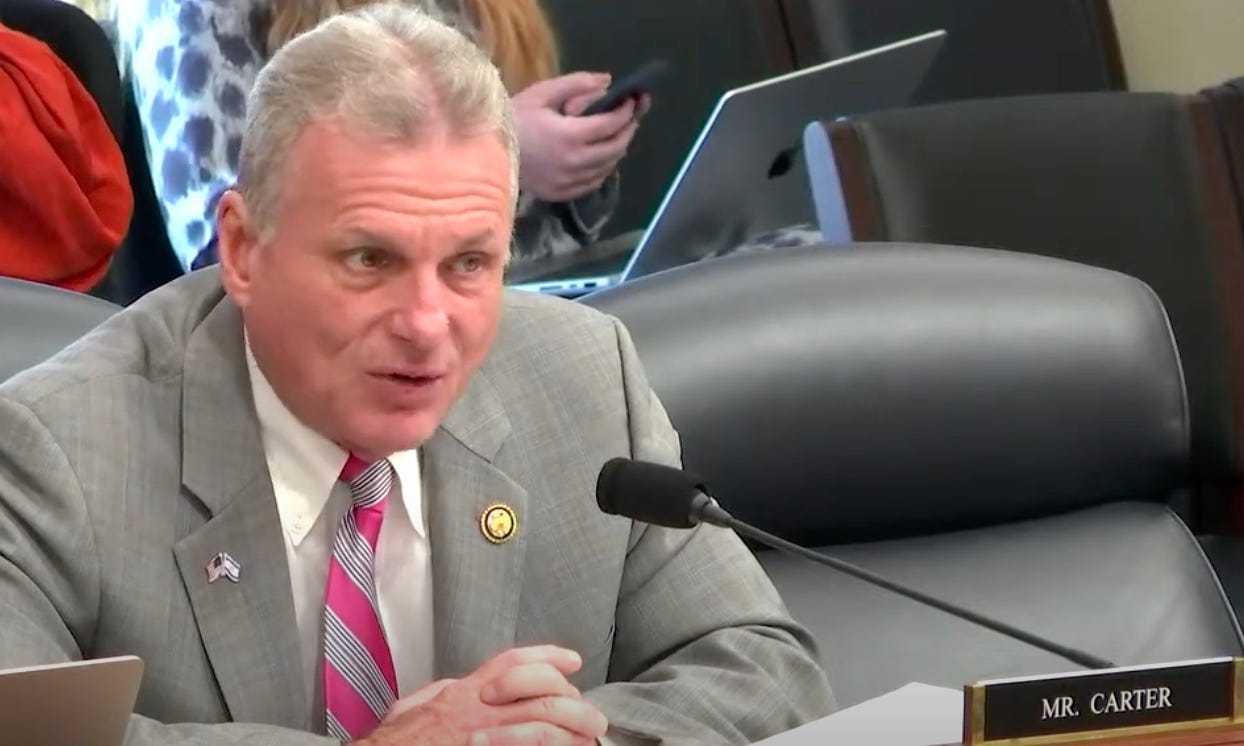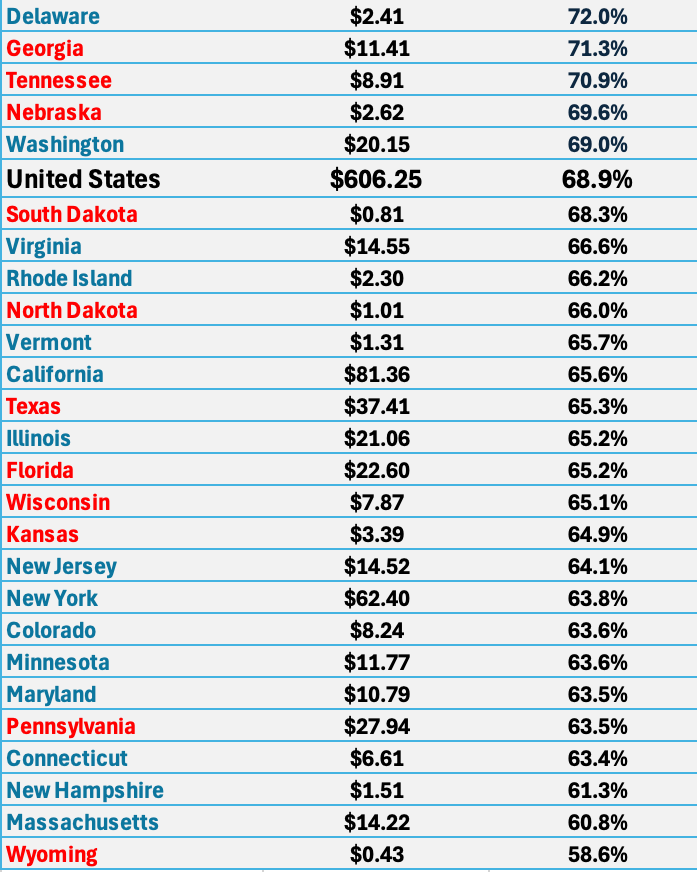The GOP's war against (their) states
The huge Medicaid cuts included in the House Budget Committee's spending blueprint will hit hardest in states that voted for Donald Trump.
Last week, at the House hearing opening this year’s federal budget deliberations, Rep. Earl L. “Buddy” Carter (R-GA) promised, “We will not kick anybody off Medicaid.” The GOP leader promised to save money instead by rooting out waste, fraud and abuse in the program.
Carter could have something to say in the matter since he chairs the health subcommittee of the House Energy and Commerce Committee. But, then again, maybe not. House Speaker Mike Johnson (R-LA) might bypass his committee and ram through across-the-board cuts in the bill needed to lift the debt ceiling, which must be passed in the next few weeks to avoid a government shutdown.
Those concerned with health care have a lot to fear from the blueprint released by the Budget Committee. It showed the GOP will seek $2.2 trillion in cuts to Medicaid and “other Health” programs (but not Medicare — more on that below) over the next ten years. It starts slowly: cuts of $49 billion or 7% of health spending in this fiscal year, rising to $355 billion or 32% of projected spending in 2034. For Medicaid alone, that comes to a $40 billion cut this year and $1.8 trillion over the next decade.*
There is no way they can eliminate that much Medicaid spending without throwing tens of millions of people off the rolls. The program currently provides health insurance for 80 million souls. That’s nearly a quarter of the nation, more than a third of them children.
As I pointed out last week, the GAO estimated federal auditors and investigators would find at best around $52 billion in potential waste in the Medicaid program. That is barely enough to cover the first year’s proposed cuts.
Even if they were highly successful in eliminating waste during the next few years — hardly likely given they just fired the Inspector General at HHS and decimated the Department of Justice’s investigative arm — it would reduce the amount of savings available in later years to zero or near zero. Deep programmatic cuts are inevitable under their blueprint.
Given Carter’s role in determining Medicaid’s fate, let’s turn to a fellow southerner (albeit fictional) for the most appropriate response to his assertion in that Capitol Hill hearing room that there will be no one thrown off Medicaid. “Didn't you notice a powerful and obnoxious odor of mendacity in this room?” Big Daddy hollered in Cat on a Hot Tin Roof. “There ain't nothin' more powerful than the odor of mendacity. You can smell it. It smells like death.”
The biggest losers
The Congressional Budget Office has identified a number of ways that the MAGA-cowered Congress could impose cuts of that magnitude, whose primary purpose, let us not forget, is to help pay for another round of tax cuts for corporations and wealthy individuals. They could cap federal support for Medicaid, which currently stands at 69% of expenditures with states picking up the rest. They could do that either by instituting block grants, the long-time GOP goal, or slap a per capita cap on support for each beneficiary.
Either way, the program would be legislated to grow at the rate of inflation, which is substantially below economic growth or the growth in health care spending. That would put state health departments in the unenviable position of doing the Feds’ dirty work. They would have to either throw people off the rolls or raise taxes sharply on their own residents.
Who would be hurt most by this? If you’re guessing Massachusetts, California and most of the blue-run states in between, guess again. Fully 20 of the top 24 states most dependent on federal funding to run their Medicaid programs voted for Donald Trump in the last election. Eleven of those states have more than a quarter of their populations on Medicaid.
Other options
The CBO offers other options for cutting spending. Congress could eliminate the federal match for taxes that 49 states and the District of Columbia levy on providers, which would save the federal government an estimated $630 billion over ten years. The states use that money to help pay for their share of the Medicaid program.
As the Congressional Research Service pointed out in this issue brief, these taxes are progressive in that they redistribute money from hospitals, nursing homes and physician offices with few Medicaid patients to those institutions that care for a disproportionate share of the poor. Eliminating the federal match is a shell game: It would force states to either pick up those costs or repeal the taxes, which would be doubly punishing for safety net institutions.
The GOP-run Congress could also lower the federal match for people in the 40 states and District of Columbia who expanded the program under the Affordable Care Act to cover people earning up to 138% of poverty wages. The federal government pays 90% of the cost of covering those workers and their families. Turning that into the standard match rate of 50% to 77% would reduce federal Medicaid spending by $596 billion over ten years, according to the CBO.
This would strike a major blow to the Medicaid expansion. At least a dozen states have laws that repeal their Medicaid expansions if the federal match rate drops. The Kaiser Family Foundation estimated anywhere from 19% to 49% of people on Medicaid in expansion states would lose coverage under this proposal. Some, maybe many, would purchase ACA plans on the exchanges. The more that do, the less the savings for the federal government since all would be heavily subsidized — unless the GOP Congress reduces those subsidies, too.
The path not taken
The most costly boondoggle in health care is never mentioned in the House Budget Committee report. The CBO estimates that Medicare could generate substantial savings if it simply paid private insurers covering Medicare Advantage (MA) beneficiaries the same amount as if they had remained in traditional fee-for-service Medicare.
As I’ve reported here many times, Medicare pays insurers a risk-adjusted monthly premium to cover seniors who choose an MA plan. The “risk” is determined by how sick people are, which insurers can game by coding for illnesses they never treat. The Medicare Payment Advisory Commission estimates Medicare loses over $80 billion a year from insurer upcoding — and that’s after slapping an across-the-board 5.9% reduction in payments to insurers.
Increase that reduction to 20% and it would save Medicare $1.0 trillion over the next decade — more than any other option identified by CBO. Of course, this would result in higher cost sharing, higher premiums and fewer supplemental benefits for MA enrollees (so those plans looked more like traditional Medicare) or it would reduce profits for MA insurers.
How’s that for a popular slogan? Don’t throw people off Medicaid to pay for your tax breaks for big corporations and the wealthy. Stop private insurers from ripping off Medicare.
* For wonks: The Medicaid share of “Medicaid and Other Health” in the House Budget Committee report was derived in the following fashion. I divided the Congressional Budget Office’s projected federal spending for Medicaid of $600 billion in 2025 under current law by the House Budget Committee’s projected total spending for “Medicaid and Other Health” of $726 billion in 2025 before making cuts. The “other” health includes funding for the National Institutes of Health, the Food and Drug Administration, the Centers for Disease Control and Prevention and other Health & Human Services agencies.







On the bright side, if you happen to be a conscienceless monster like Trump/Musk, taking away medical care paid for by Medicaid will lower the mean age of Americans and cut down on the social security outlay because many more will die! I have no doubt these monsters have considered this, and giggled gleefully at it!
His voters are reading tea leaves to decipher his deeper intentions, and it always comes up in their favor. It’s time to stop thinking that this war can be fought by appealing to the rationality of Trump country. The chances of our correcting things through a vote are quickly receding. We’ll be lucky to get to the mid-terms, much less a fair vote